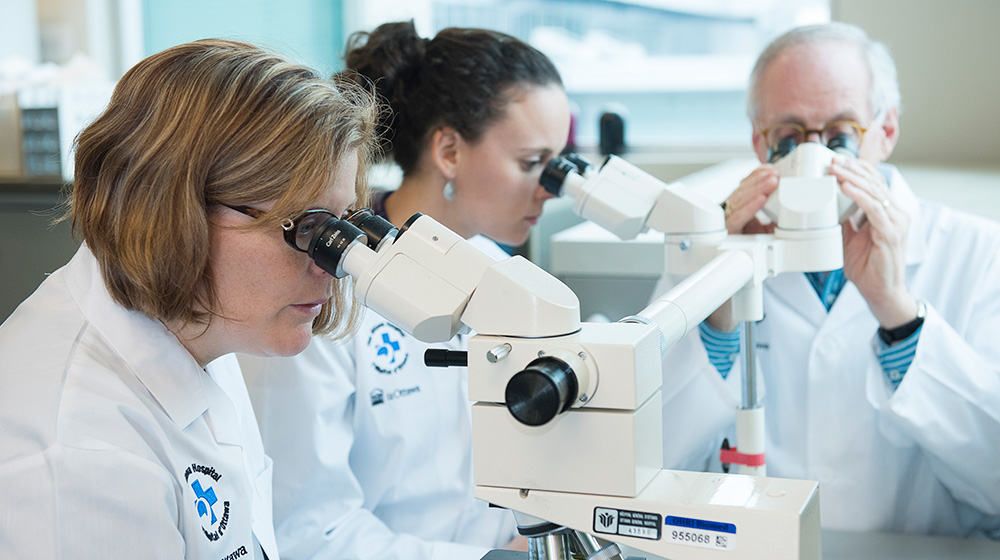
Health research is without a doubt one of the most challenging and yet one of the most rewarding of pursuits. The most challenging part is securing funding in an increasingly competitive environment, while the most rewarding part is being able to answer fundamental questions, and by doing so, to improve the health of people in Ottawa and around the world.
This year, our research improved health in many ways. For example, we developed a new tool to help breast cancer patients manage the side-effects of chemotherapy. We discovered that a drug commonly used in certain kidney transplant patients does more harm than good. And we led clinical trials of new drugs and devices that are helping people with lung and brain cancer live longer.
We also made ground-breaking discoveries in the laboratory that are providing hope for patients with diseases such as muscular dystrophy, heart disease, diabetes and osteoporosis.
One of our unique strengths at The Ottawa Hospital is the ability to translate these discoveries into new therapies and test them in rigorous clinical trials. Indeed, this year we launched a highly innovative clinical trial of a double-virus therapy for cancer. This trial is the first in the world to use a combination of two viruses to attack cancer cells directly and stimulate the immune system to attack the cancer as well. We also launched the world’s first clinical trial of a stem cell therapy for septic shock. While these trials are still ongoing, some of our other world-first trials of “made-in-Ottawa” therapies were recently completed, with promising results.
We are also recognized around the world for conducting large clinical trials that compare different treatment approaches and change medical practice. We’re particularly pleased that The Ottawa Hospital had two studies on a list of the top 12 practice-changing research papers published in 2015 by the New England Journal of Medicine – without question the top medical journal in the world. We’re proud to feature one of these studies, focusing on blood clots and cancer, as the spotlight in our annual report this year.
And although research funding will always be a challenge, we are very pleased that our researchers continue to rank well above the national average in major funding competitions. For example, we were awarded 22 grants worth more than $28 million in the most recent competition from the Canadian Institutes of Health Research, achieving a success rate that was close to double the national average.
All these successes have translated into a score of 84 percent in the composite research metric developed to assess our performance.
As well, this year the Ottawa Hospital Research Institute has taken an important step in further strengthening alignment and connection with The Ottawa Hospital, both in terms of governance and in terms of how we present ourselves to our community and to the outside world. We now speak with one unified voice, embodied by our new tagline: Inspired by research. Driven by Compassion. This exercise will also serve to strengthen our important relationship with the University of Ottawa and is an important step towards better integration of health research activities within the city.
Finally, we would like to take this opportunity to thank all our researchers, trainees and staff for their exceptional hard work, as well as our board members for their oversight and guidance. And most of all, we would like to thank our patients and community, who inspire and support us every day.
“One of our unique strengths at The Ottawa Hospital is the ability to translate these discoveries into new therapies and test them in rigorous clinical trials.”